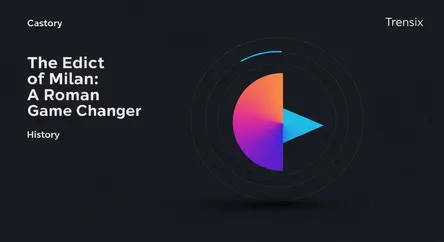History
The Edict of Milan: A Roman Game Changer

Discover the 313 AD proclamation that ended Christian persecution in the Roman Empire and forever changed the course of Western history.
What is it?
The Edict of Milan was a landmark proclamation issued in 313 AD by Roman emperors Constantine I and Licinius. It officially ended the long-standing, often brutal persecution of Christians within the Roman Empire. The edict granted full tolerance to all religions, allowing every person "the freedom to worship whatever deity they pleased." A key provision was the restoration of all property, such as churches and lands, that had been confiscated from Christians during previous periods of persecution. It did not make Christianity the state religion but gave it legal status and protection.
Why is it trending?
The Edict of Milan remains a pivotal moment in history because it marked a profound turning point for religious freedom and the future of the Western world. Before this decree, Christians faced severe oppression. Afterward, Christianity began its ascent to becoming the dominant religion of the Roman Empire. This shift in policy had immense political and cultural consequences, laying the groundwork for the Christianization of Europe. The edict is studied as a crucial event that fundamentally reshaped the relationship between church and state, a dynamic that continues to be relevant today.
How does it affect people?
For early Christians, the edict's impact was immediate and life-altering. They could finally practice their faith openly without fear of torture or execution. This newfound freedom allowed the church to grow exponentially, build new places of worship, and organize its structure and doctrine more formally. For the Roman Empire as a whole, it was an attempt to promote civic unity and stability after years of internal conflict. While it granted freedom to all religions, it set a precedent that ultimately led to Christianity becoming the state religion decades later, forever altering the empire's spiritual landscape.